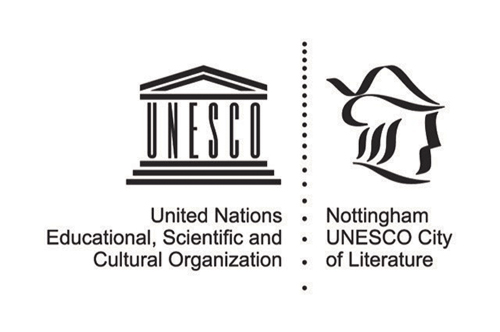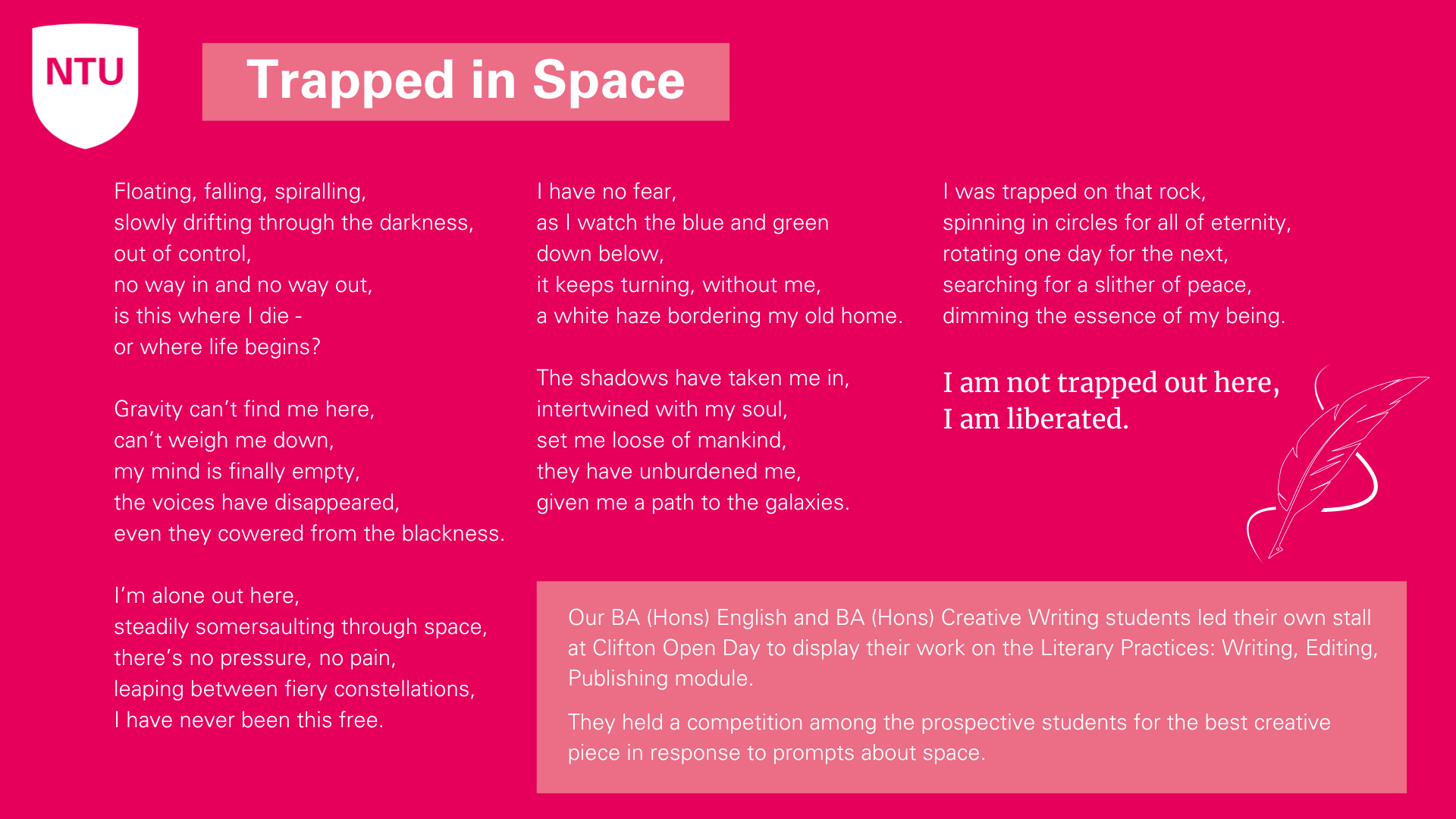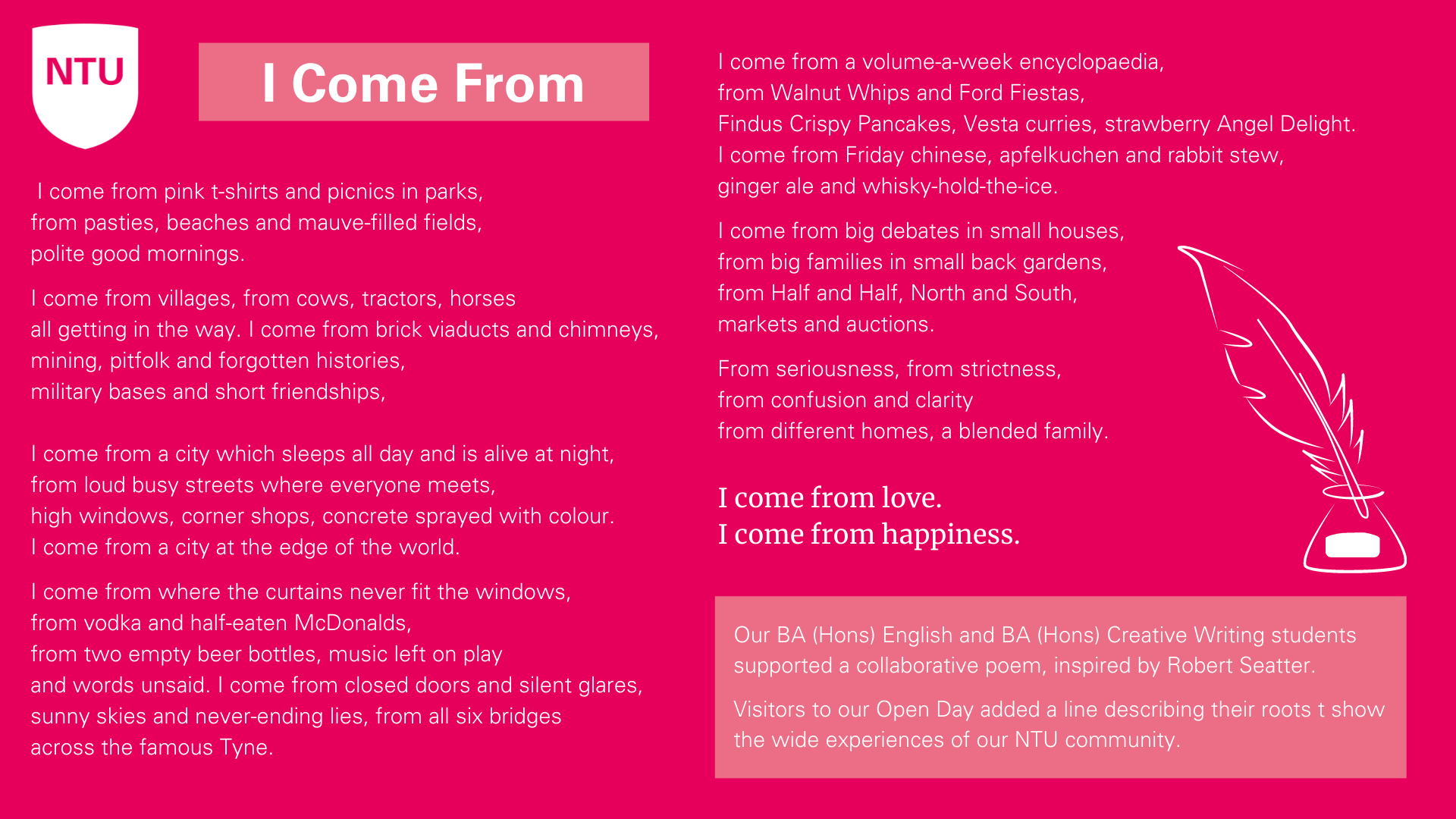English BA (Hons)
- Level(s) of Study: Undergraduate
- UCAS Code(s): Q300
- Start Date(s): September 2023
- Duration: Three years full-time, four to seven years part-time
- Study Mode(s): Full-time / Part-time
- Campus: Clifton Campus
-
Entry Requirements:
More information
Introduction:
-
Active engagement with contemporary cultural issues
-
Informed by cutting-edge research and developments in the discipline, including the subject’s relationship with the digital
-
A highly personalised, inclusive, and supportive environment
-
Embedded employability pathways, and opportunities for practicing skills in expression and creativity in workplace settings and the wider community
Throughout the ages, the written word has been a powerful force for political action, historical documentary, creative expression and transformation. At NTU, we share your passion for English, and on the degree we bring this passion to enhancing, interrogating, and challenging your understanding, while also developing your talents and strengths.
Why Study English at NTU?
English at Nottingham Trent University is a future-facing course that interrogates the past. We encourage our students to think creatively about real world issues and focus on how knowledge of literature matters in today’s world. Flexibility and creativity in expression and thought is central to our teaching, learning, and assessment, all of which is carried out via a range of methodologies embracing both the traditional and the digital. The course team are all active researchers and writers, whose expertise in new developments in the discipline feeds directly into your modules. You will study texts from the Renaissance to the present and be encouraged to stretch yourself intellectually and imaginatively by exploring literature both as practitioners and critics.
Our lively learning community offers a nurturing, friendly, and supportive environment, with extensive pastoral provision. Students select their own pathway through the course via a variety of optional modules which gives the flexibility and freedom to develop critical and textual specialisms and interdisciplinary connections, finally deciding on a traditional dissertation or alternative capstone final project.
The English team’s links with cultural organisations and industry in Nottingham (for example, Nottingham UNESCO City of Literature) and beyond directly feed into the course, offering our students opportunities to engage with the wider local community. Unlike many of our competitors, our employability pathway is embedded, ensuring direct connections between studying the subject and our students’ futures.
What's Different About Us
Approachable and accessible, we are proud of our consistently high student satisfaction score and our range of modules and teaching methods. We are a relatively small course - we know our students and they know us! Year 1 is a shop window, year 2 gives you a chance to explore different concessions, with more optionality; and in year 3, as well as having a passion you want to explore in a dissertation, you will know the exact modules you want to choose to finish your degree.
And that's not everything ...
You'll study English in a City and University that celebrates Literature: NTU is a lead partner of Nottingham UNESCO City of Literature, and has established a variety of extracurricular opportunities and a host of partners in the creative industries.

In 2015, Nottingham was designated a UNESCO City of Literature – one of only 20 in the world – thanks to our long and diverse literary history. From D H Lawrence to Alan Sillitoe and Lord Byron to J M Barrie, many wonderful wordsmiths have called Nottingham home.
The University is also a key partner in the city’s Creative Quarter. Centred around the historic Lace Market and Hockley areas, it’s a hotbed of culture, and home to many of the city’s independent retailers, bars, restaurants, small creative companies, and artists.
93% of BA (Hons) English students would recommend studying at NTU to others (NTU 2022)
What you’ll study
Don’t just take our word for it, hear from our students themselves
Student Work
Video Gallery
Careers and employability
Your career development
As one of our graduates you will possess a wide range of academic and transferable skills.
Academically, you’ll have an extensive knowledge of a wide range of literary texts. You’ll gain an understanding of the complex nature of literary languages, and the ability to evaluate and debate theoretical viewpoints, which is an important life skill as well as being of benefit to a whole range of employment activities.
However, the major transferable skill of all English graduates is the ability to communicate effectively both in speech and in writing. These skills are invaluable for a wide range of occupations and settings.
Graduates have gone on to develop their careers within large well known organisations (such as Marks & Spencer, BBC etc.) and many graduates are forging successful careers in small to medium sized companies, reflecting the nature of the UK economy. Graduate roles include: publishing, marketing, PR, retail, finance and recruitment.
Some students choose to progress to further study, either to continue their research within English, or to gain more directly vocational qualifications such as journalism, teaching, law and social work.
Employability
Our friendly and experienced careers consultants will work closely with you at every stage of your career planning, providing personal support and advice you won't find in a book or on the Internet. You will find consultants on all three campuses. Find out more about our Careers Service.
Campus and facilities
How to apply
Ready to join us? Then apply as soon as you can.
For the full-time route just click the Apply button at the top of the page and follow our step-by-step guide.
If you're applying for the part-time route please apply online using the NTU Applicant Portal.
Make sure you check the entry requirements above carefully before you do.
Writing your application and personal statement
Be honest, thorough and persuasive in your application. Remember, we can only make a decision based on what you tell us. So include all of your qualifications and grades, including resits or predicted grades.
Your personal statement is a really important part of your application. It’s your chance to convince us why we should offer you a place! You've got 4,000 characters to impress us. Make sure you use them to show how your skills and qualities are relevant to the course(s) you’re applying for. For more hints and tips, take a look at our page on how to write a good personal statement.
Keeping up-to-date
After you've applied, we’ll be sending you important emails throughout the application process so check your emails regularly, including your junk mail folder.
You can get more information and advice about applying to NTU on our Your Application page. Good luck with your application!
Need help with your application?
For admissions related enquiries please contact us:
Tel: +44 (0)115 848 4200
You can apply for this course through UCAS. If you are not applying to any other UK universities, you can apply directly to us on our NTU applicant portal.
Application advice
Apply early so that you have enough time to prepare – processing times for Student visas can vary, for example. After you've applied, we'll be sending you important emails throughout the application process – so check your emails regularly, including your junk mail folder.
Writing your personal statement
Be honest, thorough, and persuasive – we can only make a decision about your application based on what you tell us:
Would you like some advice on your study plans?
Our international teams are highly experienced in answering queries from students all over the world. We also have members of staff based in Vietnam, China, India and Nigeria and work with a worldwide network of education counsellors.
- Complete this simple form to keep in touch with the International Office.

